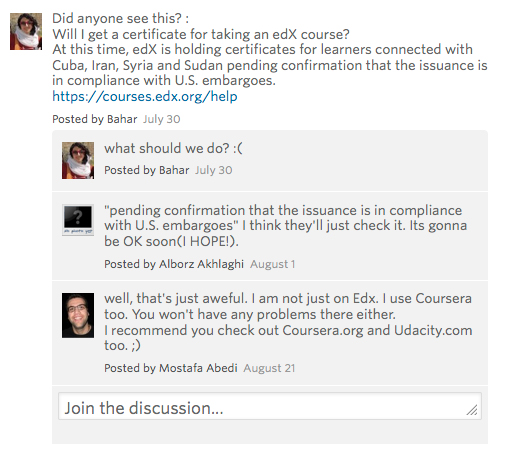You have /5 articles left.
Sign up for a free account or log in.
Yesterday’s news that Coursera and Udacity need to follow US sanction rules is a reminder that the forces shaping the evolving global geographies of MOOCs is an issue that needs to be grappled with more thoroughly and systematically.
In recent entries here on Inside Higher Ed, I've argued that the MOOCs phenomenon has helped deterritorialize higher education institutions and practices via their 'global reach’ such that the American-centric debates about MOOCs (e.g., completion rates; their uses to resolve austerity-induced public higher ed challenges), are important, yes, but just the edge of much broader debates that need to be engaged in.
From the global reach of MOOCs, to the cosmopolitan nature of the labor force working at the offices for platforms like Coursera and EdX, we see glimmers of a post-national higher ed future emerging. Moreover, we also see a global MOOC development agenda emerging, one backed by international organizations like the World Bank. See, for example:
- MOOCs in Africa (EduTech, 12 April 2013)
- Missing Perspectives on MOOCs -- Views from developing countries (EduTech, 19 April 2013)
- Debating MOOCs (EduTech, 23 April 2013)
- Coursera Equity – Summary of Investment Information (IFC, 20 May 2013)
- Coursera Raises Millions (Inside Higher Ed, 10 July 2013)
- More about MOOCs and developing countries (EduTech, 12 November 2013)
Nation-states are also using MOOCs to promote national higher education systems abroad to target markets (e.g., a taste of Britain in India, courtesy of FutureLearn; Francophone Africa courtesy of France Université Numérique, and powered by EdX).
But, as the economic geographer Peter Dicken has argued so eloquently over the course of his career, firms and organizations are placed - they're born and grounded in locales, even when they aspire to operate at a genuinely global scale.
Dicken’s point – about the ‘placing of firms’ - was hammered home in ‘Online education platform Coursera blocks students in Syria and Iran’ in Wamda yesterday. Phil Hill and I chatted about this on Twitter yesterday, and he has a nice summary about the Coursera/Udacity/EdX sanctions story here.
While this issue is still being investigated, I see three initial take-home messages from what is a rather perturbing development.
First, it appears as if the output of MOOCs has been defined by the US state as tradable “services” versus “information” in the US Treasury sanction documents for Iran and Syria, and in this Coursera note. Given this, the content of MOOCs mediated and propelled by US-registered MOOC platforms cannot be transmitted into said territory for they break sanction rules. Keep in mind that the broader regulatory context here regarding GATS and the trade in services (including education services).
Second, and most obviously, this is a bizarre and depressing development. How can the US Government seriously deem engagement with this array of Coursera courses, or this array of EdX courses, as supporting the regimes that sanctions and embargoes are designed to put pressure on? And, relatedly, do government officials and leaders really think preventing access to MOOCs and associated outcomes (e.g., certificates) will generate the types of internal political pressure they are supposedly designed to do? You decide:
Third, what role are MOOC platform partner universities playing in these deliberations? Do they even know? I doubt it, though I hope someone proves me wrong.
In this new global higher ed landscape, it is not enough to establish bilateral relations with intermediary firms/organizations like EdX, Coursera, Udacity, FutureLearn, France Université Numérique, et al, and just use their services. Some broader strategic/governance rules of the game may need to be established. After all, if universities are willing to cede some MOOC-related authority to an association like the American Council of Education (ACE) regarding which MOOCs are credit worthy, then surely they should work via their relevant associations to collectively ensure that some very important global access issues, principle issues, and key precedents, are handled in as strategic a manner as they deserve to be.


